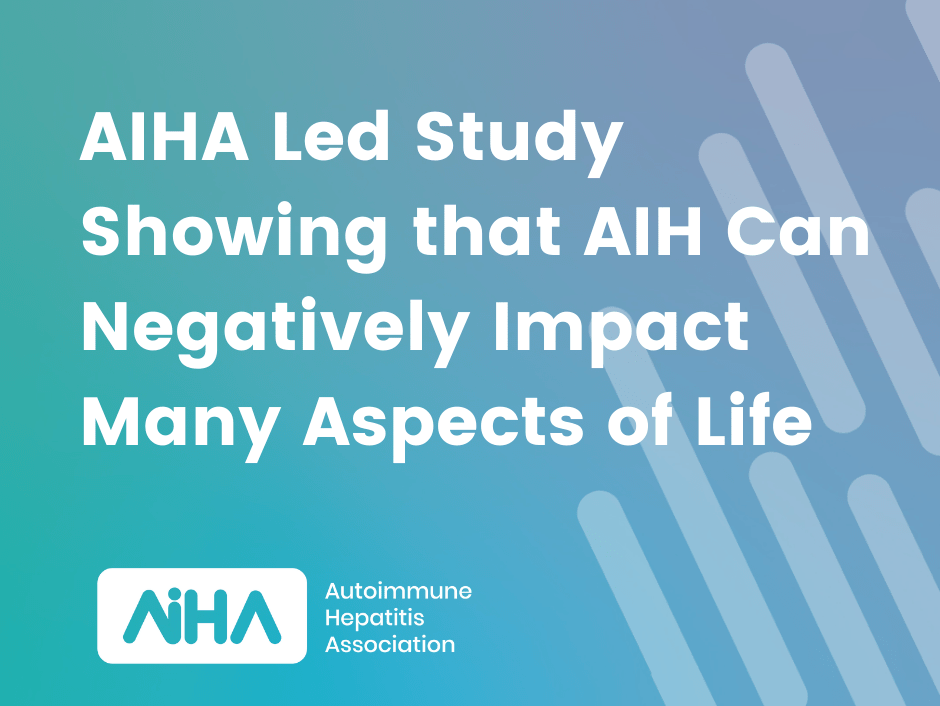The Autoimmune Hepatitis Association

We are thrilled to share that the Autoimmune Hepatitis Association (AIHA) recently had its first patient-initiated research paper published! This paper represents the first piece of published research about autoimmune hepatitis (AIH) that focuses on the lived experiences of patients.
In 2020, the AIHA held a series of focus groups with AIH patients to better understand the impact the disease has on their everyday lives. A total of 30 patients participated and shared their diverse, insightful, and important perspectives of the disease.
Study results confirmed things we already knew from other papers and from hearing from patients: AIH negatively impacts quality of life, in some cases quite dramatically. Patients can experience symptoms like fatigue, anxiety, depression but also medication side effects like weight gain, edema, osteoporosis, among others.
The AIHA took it a step further than other researchers have before and asked questions around how the disease impacts different facets of daily living. It turns out that AIH can negatively impact almost every aspect of life. From work to marriage, friends, hobbies, exercise, travel and diet, it’s clear that AIH impacts a lot more than just the liver. Here are just two of the many quotes that stood out from the focus groups:
- “We don’t have a broken leg or a finger that they can visually see. So, I think sometimes family tends to forget that we are sick and that I do need time to rest and take a breather.”
- “I tend to push and just keep going and put my head down and just keep going, doing what I have to do, work, take care of family, whatever.”
Not surprisingly, during the focus groups, patients had many good ideas about what is needed to treat and better manage this disease, including:
- Develop new and better treatments that reduce symptoms
- Provide high quality evidence-based nutrition recommendations
- Recommend alternative strategies (massage, acupuncture, meditation, yoga, etc.). Patients want to be able to take proactive steps to stay healthy and manage their disease.
- Manage mental health symptoms, something many hepatologists never ask about.
- Find a cure
- Reduce stigma. Doctors and medical staff at primary care clinics and hospitals don’t always understand what AIH is and think it could be caused by patients’ alcohol use or risky behaviors. It really makes a challenging disease even more difficult, leaving patients feeling ashamed and embarrassed.
- Educate doctors. Patients think doctors need additional education not only to address stigma but more general awareness about the disease. Patients sometimes struggle with poor communication and follow-up from their providers and some reported even feeling abandoned by providers who didn’t provide timely follow-up care. One focus group participant stated, “I feel like I’ve been diagnosed and then dumped out into my home.”
This focus group study made it clear that a lot of work is needed, not only additional research but additional education for patients and doctors alike. The AIHA is excited to take some steps to begin to address these issues.
Read the full article in Digestive Diseases and Sciences.
A special thank you to AIHA Executive Director Craig Lammert, M.D.; Claire Drucker, Ph.D., a professor at Indiana University who provided the AIHA with mentorship in qualitative research; Kelsey Green, a clinical research specialist at Indiana University; Emma Jones and Margaret Watkins, students who worked on the project; and Erin Anderson, AIHA Director of Programs and Advancement who conducted the focus groups.
We’d also like to extend our gratitude to the 30 dedicated patients who participated in the focus groups and candidly shared their experiences with the disease. They truly made this important piece of research possible.
